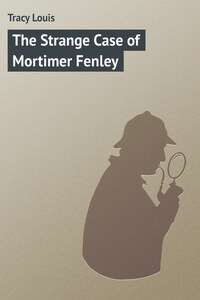CHAPTER I
A WHIFF OF VIOLETS
“I suppose one becomes used to this sort of thing in time,” thought David Harcourt, as he peered through the dusty plate-glass windows of his third-floor flat. “At present I can appreciate the feelings of a Wyoming steer when he first experiences the restraint of a cattle-truck. Or am I a caged bird? or a menagerie ape? or a mere ass? There is something in the evolution theory, after all. Obviously, one of my respected ancestors is kicking.”
Then, being a cheerful soul, he laughed, and turned from the outer prospect to face the coziness of his new abode. He did not understand yet that in No. 7, Eddystone Mansions, picked almost at haphazard from a house-agent’s list, he had hit upon a residence singularly free from the sort of thing which induced this present fit of the blues. In the first place, owing to a suit in chancery, the “eligible” building-site opposite was vacant, and most of the windows of No. 7 commanded an open space. Secondly, the street itself did not connect two main thoroughfares; hence its quietude was seldom disturbed by vehicles. Thirdly, and, perhaps, most important of all, his neighbors, above, below, and on three sides, were people who had achieved by design what he had done by accident – they had taken up their abode in Eddystone Mansions on account of the peace thus secured in the heart of London.
For London has a stony heart with wooden arteries, through which the stream of life rushes noisily. To ears tuned by the far-flung silence of the prairie this din of traffic was thunderous. To eyes trained by the smooth horizon it was bewildering to see a clear sky overhead and a sun sinking slowly, like a dim Chinese fire-balloon, into a compound of smoke and chimneys. In fact, David Harcourt came to the conclusion that Londoners, as a race, must be purblind and somewhat deaf.
“I wonder if I can stand it?” he commented. “I saw a map of South Africa in a shop window to-day. It looked wonderfully attractive. Yes, I am beginning to believe there is neither claw nor feather in my composition. ‘Kicking’ is the right word – hoof – ass! Oh! the line of descent is clear.” Then he laughed again, taking a box of cigars off the top of a bookcase, and any one who heard him laugh would have grasped the reason why men soon called him “Davie,” and women smiled when he looked at them.
Dame Nature, aided by his less remote ancestors in the evolutionary tree, had been good to him. It would have needed the worst “environment” ever dreamed of by sociology to make him a degenerate. As it was, a healthy upbringing, a fair public-school education, and the chance that a relation of his owned a Wyoming ranch, joined in fashioning an excellent specimen of lusty and clean-souled young manhood. But that same general wet-nurse, who had intended David to lord it over herds and vast pastures, had complicated matters by throwing a literary kink into the deftly coiled strands of his composition. Thus, at the age of twenty-five, he took more interest in scribbling stories and searching for rimes than in toting up the proceeds of sales at Chicago stock-yards. Worse than that, having oft imagined and striven to depict various ethereal creatures typical of the Spirit of the Dawn, the Fairy of the Dell, or the Goddess of the Mist, he had refused, most emphatically, to wed the elderly rancher’s daughter, his relative, a lady blessed with more wealth and weight than was necessary for any one woman in the world.
So, like many another youngster in the far lands, he heard the voice of London calling through every book and newspaper he read. It was a siren voice, devoid of accent. The Wyoming wooing, too, became a serious matter; hence, like one of the dove-eyed oxen he knew so well, he stampeded in sudden panic, realized his personal possessions, and, in the vernacular of Sioux Pass, “lit out for the nearest depot, an’ boarded an east-bound train.”
He had now been in England a month, in London a week. From the landing-stage at Liverpool he had gone to visit the country cousins who superintended his childhood and education after the death of his mother, that lady having been stricken down by the hand which killed her soldier husband at Dargai. He found the cousins snug in their Bedfordshire nest. The squire-like head of the household wondered dully why any man should quit a place where he could “get on” to seek a precarious livelihood in a land which was “rapidly going to the dogs.” David certainly received more encouragement from the younger members of the family, especially from a bright-eyed maiden of eighteen, who thought London “awfully jolly,” and vowed a literary career to be “quite too devey for anything.”
But David was level-headed enough to see that the verdict of squire and maid were equally unfavorable.
Then followed a few days in a big hotel. He paid a round of useless calls at the offices of magazines that, to his certain knowledge, printed all sorts of rubbishy articles about cow-boy life, but opposed a phalanx of commissionaires against a man who could not only round up an infuriated herd, but could also describe the feat deftly with a pen. Ultimately, he resolved to lay siege to the citadel which he was unable to storm, and pitch his camp over against the tents of the enemy. He took a furnished flat, “with plate and linen, gas-stove, electric light, bath H. and C.,” for six months.














